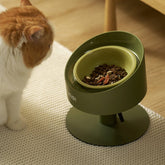The Insider's Guide to Adopting vs. Buying Cats

Bringing a cat into your home is an exciting prospect, but it requires making a crucial decision: should you adopt from a shelter or purchase from a breeder? Both options have their merits and ethical considerations, and it's important to make an informed choice for the well-being of your new feline friend. In this blog, we'll explore the factors to consider when deciding between purchasing or adopting a cat, weighing the pros, cons, and ethical implications of each choice.
Adopting a Cat
Saving Lives
Choosing to adopt a cat can be a truly meaningful decision. Many shelters have a surplus of cats of all types, ages, and backgrounds, some of which may have been abandoned or rescued from the streets.
By adopting from a shelter, you're offering a new home to a cat that might not have had a chance otherwise. It's a compassionate act that can be incredibly fulfilling, knowing that you're providing a caring environment for a cat in need.
In addition, it is a well-known fact that street cats, unfortunately, have a shorter lifespan compared to their domesticated counterparts.
On average, these felines can live up to six years, but due to various factors, some may not make it past four years. Factors such as illness or injury can contribute to a shorter lifespan, while others may beat the odds and live longer. For pet cats, their lifespan can be extended up to 12 years, given the proper care and attention.
Variety of Options
When you choose to adopt a cat from a shelter, you'll have the opportunity to select a feline companion that fits your family and living situation. With a variety of cats available, you'll find the perfect match for your lifestyle, whether you're looking for a playful kitten or a more relaxed adult cat. Shelters offer cats of all ages, breeds, colors, and temperaments, so you're sure to find the right cat for you.
Cost-Effectiveness
When you choose to adopt a cat from a shelter, you can save money by avoiding the high costs of purchasing a cat from a breeder. Shelters typically take care of basic health needs such as vaccinations, spaying/neutering, and micro-chipping, which can help reduce the initial financial burden of pet ownership. This makes adoption a more affordable option, especially for those on a tight budget.
Health and Behavioral Assessments
Before a cat is available for adoption at a reputable shelter, they undergo comprehensive health and behavioral evaluations. This provides you with valuable knowledge about the cat's disposition, potential health conditions, and how well they will fit in with your family. Being fully informed enables you to make an educated decision and ensures a seamless transition when bringing your new feline friend home.

Potential Issues when adopting a cat
Domesticated Cats vs. Stray Cats
There is a difference in behavior between feral cats and those that have lived in homes. Feral cats tend to be unfriendly and avoid being touched, while cats that have lived with humans are more likely to seek affection. If you provide food and water to a stray cat, it may return to the same location and over time, you may be able to establish a relationship with it. However, feral cats are typically more fearful and may run away and hide when approached, making it harder to interact with them.
Health Concerns
It's important to be mindful of potential health issues when taking in a stray cat. While cats who have been on the streets may not necessarily be unhealthy, it's important to evaluate their medical needs by taking them to a clinic. This involves ensuring that they are sterilized, vaccinated, treated for fleas, de-wormed, and checked for ear mites, among other things.
Concerns Regarding Behavior
It's not uncommon for cats to experience behavioral issues when adjusting to a new home. To prevent them from ruining furniture, it's important to provide them with a scratching post. Although it can be frustrating, it's essential to be patient and give them time to adjust.
Addressing Timidity or Fearfulness
When adopting a street cat, be patient as they may be timid or fearful, especially if they've experienced trauma. Rushing the introduction process may only make matters worse, take the time to build trust and show them they're in a safe and loving environment.

Buying a Cat
Predictable Breed and Characteristics
If you have specific preferences for characteristics in a cat breed, purchasing from a reputable and ethical breeder may be the ideal option. Breeding establishments concentrate on preserving particular breed standards, offering you a selection of cats with attributes that match your desires, such as specific coat color, size, or personality traits.
Known Background
By purchasing a cat from a breeder, you'll have the advantage of knowing its lineage and background, which can be useful in determining any potential health problems that may be common in the breed. This knowledge can assist you in making informed choices about caring for your cat.
Early Socialization
Cats bred by trustworthy breeders are frequently socialized at a young age, which can enhance their ability to adapt and fit into your home environment. When exposed to different surroundings, individuals, and other animals early on, cats can develop into self-assured and well-adjusted pets.
Supporting Responsible Breeding Practices
When you buy a cat from a breeder who values the health and welfare of their felines, you are promoting ethical breeding practices. These breeders prioritize the well-being of their animals and avoid harmful practices like overcrowding and improper living conditions.

Potential issues with buying a cat from a breeder
They could be too reliant and needy
When considering buying a kitten from a breeder, it's important to keep in mind that they can be quite clingy and dependent, especially in their early stages. Training a kitten requires a significant amount of time and energy, so it's important to make sure you can commit to that. How much effort is required to raise a kitten?
Higher cost
When it comes to acquiring a feline companion, it's worth noting that adopting from a rescue organization or adoption center is generally a more cost-effective option than purchasing from a breeder. While some breeders may charge steep fees for cats with impressive pedigrees, adoption fees typically fall within the range of $300-$500 and often include initial medical procedures such as vaccinations and spaying/neutering.
Lengthy waits
It's common for breeders to have lengthy waitlists for pedigree cats, especially if they come from champion or show-winning bloodlines. It's not uncommon to have to wait for several months, or even up to a year, before you can finally bring your new furry friend home.
Conclusion
Choosing whether to adopt or buy a cat is a personal decision that requires thoughtful consideration of various factors. Adopting a cat from a shelter can be a cost-effective option that also saves lives and offers a diverse selection of feline companions.
On the other hand, purchasing a cat from a responsible breeder can provide you with predictability in terms of breed and characteristics, a known background, early socialization, and the satisfaction of supporting ethical breeding practices. Ultimately, your decision should be based on your unique circumstances, preferences, and values. Regardless of which option you choose, the most important thing is to provide a warm and nurturing home for your new feline companion, ensuring a happy and satisfying bond for both of you.























